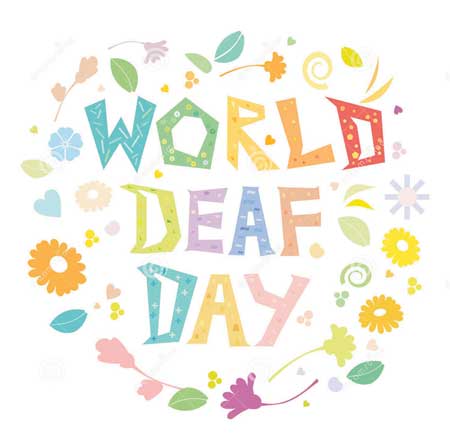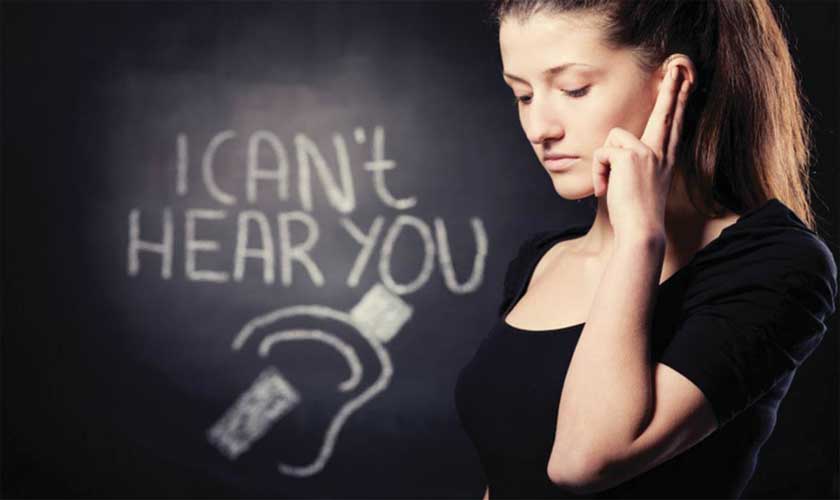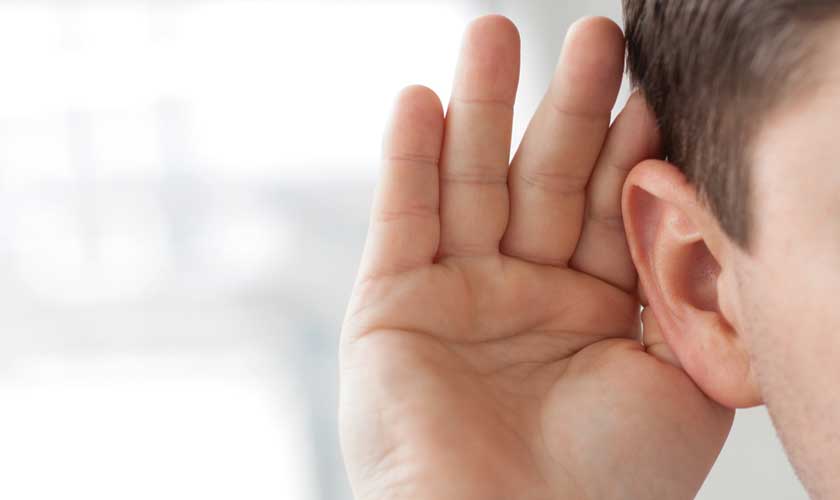Recently, World Deaf Day was celebrated to focus on the problems of those with hearing impairment. You! takes a look...
Recently, World Deaf Day was celebrated to focus on the problems of those with hearing impairment. You! takes a look...
Many of us don’t realize it, but we are blessed to have all five of our senses which include sight, hearing, taste, smell and touch. You lose one sense and the journey of how you experience life completely changes. Such are the sufferings of the deaf who may be able to see, smell, taste and touch but will never be able to hear the sound of the birds chirping or hear the thunder strike. Having a hearing impairment surely affects the quality of life and also deprives one of enjoying simple luxuries including going to the cinema, driving, building relationships, or working. However, life does not have to be sorrowful for the deaf and all that needs to be done is to cater to their needs by spreading awareness regarding this impairment. A solution can be produced only if the problem is tackled head on. This is where initiatives like World Deaf Day step in. This day is celebrated across the globe and is dedicated to approximately 70 million of the deaf population of the world. Read on to find out more about the day.
World Deaf Day
Around the globe, World Deaf Day is celebrated on the last Sunday of September every year and is dedicated to those with a hearing impairment whether from birth or one that is caused by injury or any disease. The day was initiated in 1958 by the World Federation of the Deaf (WFD). The WFD is an international organization composed of 130 national associations of the deaf that serves all countries and focuses on improving human rights of deaf persons, the status of national sign languages, access to education, and access to information technology and services.
The purpose of this day is to draw the attention of legislators, policy makers, and the general public to the achievements of deaf people and the concerns of those who can’t hear. It also aims to promote understanding among common people about the problems of deaf people and to make available the required resources in the community for deaf people. During this special day, organizations of deaf people worldwide are encouraged to carry out campaigns that publicize or increase awareness about deaf culture, language, and legal issues. It is celebrated with rallies, seminar and various deaf awareness campaigns. It also is a reminder of the injustice this community still suffers at the hands of societies across the world. This day is like an alarm that goes off each year to alert us that deaf people from all continents continue to be segregated by linguistic, cultural, economic and political distinctions. Last but not least, the day focuses on the importance of sign languages of the world along with the linguistic and human rights of deaf people.
Importance of sign language
The main purpose of this day is to spread awareness on how we can work as a nation to make sure the deaf are not secluded from receiving a good quality life. The only way this can be done is to spread awareness about sign language and how it can help if it is taught to people with hearing impairment.
Why is sign language important for us you ask? It is because according to the National Policy for Persons with Disabilities, 7.40 per cent of the population of Pakistan are deaf. In Punjab alone, the deaf population is up to 149235, whereas Sindh has a deaf population of 57437. The question now is, how do these individuals survive in a world where there is no knowledge of sign language? How can they be expected to live a normal life if they can’t even communicate? Not being able to communicate just makes the lives of the deaf harder. Hence, if sign language was introduced in all institutions in the initial stages, keeping in mind the deaf community, the world would become apprehensible for those with hearing impairments.
To raise awareness and knowledge, let’s take a look at the two general methods of deaf education; manualism and oralism. Manualism is instruction using sign language, and oralism uses spoken language.
Manualism is a method of education that arose in the late 18th century with the advent of free public schools for the deaf in Europe. These teaching methods were brought over to the United States where the first school for the deaf was established in 1817. The first manual schools were in Paris, France. Abbe de l’Epee, a Catholic priest, encountered two teenage deaf girls while visiting a family in the poor part of the city. He decided to take it upon himself to educate them and he invented a technique called ‘methodical signing’ from the signs the girls already used. He created a one-hand manual alphabet to be able to fingerspell French words. The language later on advanced and became classified into five parts which included: handshapes, orientation, location, movement, and facial expression, in which sentences are used and thoughts are expressed.

Oralism on the other hand, is the education of deaf students through oral language by using lip reading, speech, and mimicking the mouth shapes and breathing patterns of speech instead of using sign language. Oralism came into popular use in the United States around the late 1860s, with the Clarke School for the Deaf in Northampton, Massachusetts being the first school to start teaching in this manner, in 1867. Many deaf-educational facilities attempt to integrate both manual and oralism approaches to create a language that can help the deaf communicate better. Another point to remember is that sign language is not solely for the deaf and is often taught to those who can hear too. The correct move taken by all governments, as suggested by the WFD, is to make sign language universal.
Institutes for the deaf in Pakistan
Our nation is not far behind in providing education to the deaf and there are two renowned institutes that have been providing education for more than a decade.
Dewa Academy for the deaf:
Dewa which stands for ‘Deaf Education Welfare Society’ is the largest leading institute for children with Disability, functioning since 1967 in Karachi. A branch was also opened up in Islamabad in 1997. The institute trains students in sign language and has teachers that help educate them with the Board exam or the A levels curriculum. Hence, the students of this institute are able to give exams at par with those who can hear. In the year 2012 the students of Dewa attained top positions in Secondary/ Intermediate Board’s Exam.

While at University Level the graduates from Dewa Academy, Karachi are always on the top as well. Similar Position at Federal Board Islamabad is predominant also and the Karachi University authorities have been kind sufficient to Affiliate Islamabad Campus as Degree Awarding Institution with effect from the year 2013-14. Dewa academy is also an audio-speech centre which is providing its expert Assessment, Hearing Aid Service, personal Ear Molds and guidance/orientation to the parents. Even with their limited resources, the academy is giving their best in supporting and assisting hearing impaired individuals who want to learn and educate themselves. The institute also has a remarkable curriculum, a scholarly communal of teachers and specialists.
Pakistan Association of the Deaf (PAD):
Pakistan Association of the Deaf (PAD) was established in 1987 by few dynamic deaf youths. PAD is a member of World Federation of the Deaf (WFD) and responsible to represent Pakistani deaf community nationally and internationally. It is also affiliated with Asia Pacific Development Center on Disability (APCD).
Pakistan Association of the Deaf has more than 400 members in Karachi, and many organizations of the deaf all around Pakistan are affiliated with the association and each affiliated organization has hundreds of their own members in their locality. All the members of managing committee are deaf, and these deaf members themselves run all the affairs of association brilliantly despite the problems they face due to their hearing impairment. Being a charitable non-profitable organization, the entire funds of the institute are collected through donations from philanthropic organizations and caring individuals. Amongst the many facilities that Pakistan Association of the Deaf offers is the Computer Literacy Centre where deaf teachers teach deaf students how to operate the computer using. They also offer an English language course as well as a sign language committee that publishes books for deaf children. The deaf children are also taught basic literacy courses such as Urdu, English, Math etc, as well as a sign language course.
Pakistan Association of the Deaf is also involved in public awareness programmes including social events and seminars for the cause. Most importantly, they provide job placement for people with disabilities and in the past, they have been successful in providing jobs at companies to deaf individuals. That is not all, the institute also has a women’s wing that deals with marriage affairs and provides council King and matchmaking.
International Week of the Deaf (IWD)

The International Week of the Deaf is held in the last week of September, the same month first World Congress of the World Federation of the Deaf (WFD) was held. This year the theme for the International Week of the Deaf is: ‘With Sign Language, I am Equal’. International Week of the
Deaf is commemorated through various activities (marches, debates, campaigns, exhibitions and meetings), and call for the participation and involvement of
stakeholders (families, peers,
governmental bodies, professional
sign language interpreters, Disabled
People’s Organisations).
Why is IWD important?
International Week of the Deaf is the only week in a year that sees highly concerted global advocacy to raise awareness about the deaf community at individual, community and
governmental level. It is about
gathering together, becoming united, and showing that unity to the rest of the world. International Week of the Deaf strives to promote the rights of deaf people and highlight specific human rights topics that merit attention.
The week focuses on spreading
message as widely as possible by
ensuring that the campaign(s) will be noticed and the message will also pass to wider society through sufficient media coverage.